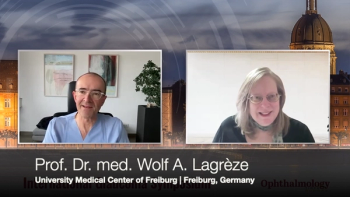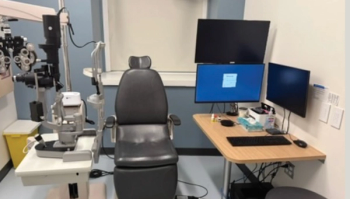
SOE 2023: What new surgeries will hit the glaucoma market?
Ophthalmology Times Europe© is proud to cover the European Society of Ophthalmology 2023. We spoke to SOE presenter Panayiota Founti, PhD, FEBO, Consultant Ophthalmic Surgeon & Training Director, Glaucoma Service Moorfields Eye Hospital, London, UK.
Video Transcript
Editor's note: This transcript has been slightly edited for clarity.
Hattie Hayes: Hi, my name is Hattie Hayes, and I'm the editor of Ophthalmology Times Europe®. We are covering the European Society of Ophthalmology (SOE), which is having its 2023 Congress in Prague, and I am joined today by Dr. Panayiota Founti. Your presentation is titled 'What new surgeries will hit the glaucoma market?' Can you give us an overview of the procedures that you touch upon in your presentation?
Panayiota Founti: Thank you very much for this invitation. It's a pleasure to be here. There is a particular focus in my presentation on that category of procedures. Because there are already financial reports predicting that minimally-invasive glaucoma surgery will dominate the global market by 2029. But what I will be talking about, mainly, is the evidence that we have on the potential role of these procedures in glaucoma care, because we live in the era of evidence-based medicine. So we need to have evidence on efficacy and safety for each one of these techniques. And that, on its own may not even be enough, we need to evaluate the validity of that evidence as well as its importance, and its relevance for the individual patient.
Hattie Hayes: I know that the number of patients who are seeking out surgical intervention for glaucoma is increasing at an enormous rate. How can the upcoming market meet the needs of that expanding patient base?
Panayiota Founti: This is a major challenge, especially when it comes to glaucoma, which is the leading cause of irreversible blindness with about 100 million people affected worldwide and approximately 10 million in Europe. And according to the World Health Organization, the number of people over the age of 80 is expected to triple by 2050. So that means that the prevalence, and hence the number of people with glaucoma, will increase worldwide. To be able to meet the demands of this expanding base in terms of surgical management, we would need procedures which are relatively quick, largely effective and overall safe. But at the same time, they need to be cost-effective because glaucoma care needs to be delivered within sustainable health care systems. And of course, all of that needs to be backed up by the corresponding evidence.
Hattie Hayes: Are there any other talks at this year's SOE that you've been especially excited for?
Panayiota Founti: While my field of expertise is glaucoma, I also specialize in cataract surgery, including complex cataract surgery. So I'm really looking forward to attending the José Barraquer Lecture this year, which will be delivered by professor Gerd Auffarth from University of Heidelberg on current and new developments on intraocular implants for cataract surgery. And whenever I have an opportunity to attend the lecture beyond glaucoma, I will always go for it.
Newsletter
Get the essential updates shaping the future of pharma manufacturing and compliance—subscribe today to Pharmaceutical Technology and never miss a breakthrough.




























